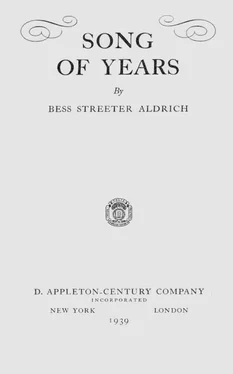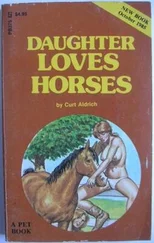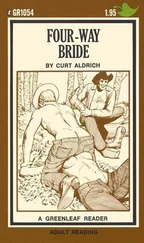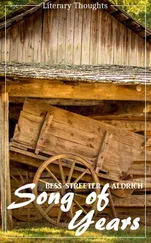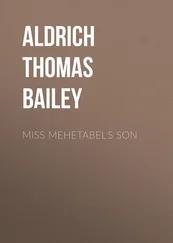There was no need to give orders to Emily. Already Ma’s stand-by was half-way to the house, scurrying along alone, with her skirts held as high as she dared to avoid the dusty October weeds. Phoebe Lou, working for the Mansons, was excused temporarily from orders. Sabina, strolling along slowly toward the house with Tom Bostwick, existing in a state of romanticism, also carried a certain insurance protection against her mother’s curt orders.
Jeanie, although unbetrothed as yet because of a coquettish desire not to admit which scalp she desired to retain permanently, was walking home between two able protectors, Sam Phillips and George Wormsby, but when half-way there, overtaken by Ambrose Willshire, she thought it a good joke to leave the body-guard in the lurch and step back with Ambrose.
Celia and Suzanne arrived breathlessly at the cabin, for Ma would brook no fooling to-day, and tied aprons around their waists, beginning at once to piece out the table with wooden sawhorses and boards, for in addition to Brother Osgood, Tom Bostwick, and Wayne Lockwood, Pa was bringing the old trapper and as like as not a half-dozen other folks.
Happily, the usual fly-brushing task was over for the season as only a few stragglers remained. That first killing frost had done more than get rid of the black pests. It had wrinkled the great pumpkin vines, left the morning-glories a soft black mass of pulp clinging limply to the side of the cabin, and turned the timber into such ruddy colors that it appeared to have caught and held some particularly vivid prairie sunset in its tree-tops.
And now the girls could hear their father’s voice shouting: “No necessity of your goin’ ’way home to try to get back at half-past two,” hospitality oozing from its every inflection.
“Yes, but he don’t have to try and squeeze them around this table,” Celia growled.
“Or be the one to wait if there’s too many.” Suzanne was laying the knives and forks the length of the pieced-out table, covered now with both long white cloths her mother had bought in York State years before, when either one had seemed of infinite capacity for any potential family.
She was wishing she knew where Wayne Lockwood was going to sit. Just what difference the knowledge would make was difficult to see, as the same black bone-handled knives and forks, the same heavy white plates with their English stamps on the back served for all. But she laid each one down with loving touch so that she might not miss the favored place.
The men sat around outside in the nice October weather waiting for dinner to be called, avoiding discussion of the courthouse feud to-day out of deference to Brother Osgood and his supposedly peaceful inclinations, dwelling rather on the differences between the old days when the trapper was monarch of all he surveyed and the way the lands of the Valley were now being gradually patented and settled.
When Suzanne saw that her mother and Emily were beginning to take up the huge platters of prairie-chicken and dumplings and the corn-bread which Sarah had hurriedly “whacked out” when she saw the crowd would “eat her out of house and home,” she ran outdoors to see if there was something left with which to decorate the center of the table.
All the flowers were gone—even the hardy goldenrod was black and soft—but she could get a few short branches of shining oak leaves, copper-colored in the warm sun, and of maples as red as the blood of the Lamb. She could see Celia in the east door of the lean-to, one arm high on the casing, her yellow head bent in such fashion that Suzanne knew she was trying to stand elegantly for the benefit of the onlookers in the yard; she heard Melinda calling out, to take her off her high horse: “Celia, if you’re trying to look like the Grecian Exile I can tell you it’s not a very good imitation with a smudge of dirt across your nose!”
But Suzanne forgot Celia, Melinda’s teasing, and the dinner, in the joy of looking into the red and yellow and bronze of the trees so soon to be weighted down with the snows of winter.
“Don’t it seem sad,” she called back to the two girls, her voice husky with emotion, “that these leaves will all be gone . . . and never again will we see the same crab-apple blossoms or wild sweet-williams or shaggy bouncing-Bets?”
“There’ll be more next year, silly,” Celia retorted.
And Melinda yelled cheerfully: “Ma will bouncing-Bet you if you don’t get in here to help with the benches.”
They gathered close on the chairs and long boards—eighteen people, with the Mansons’ new baby asleep in a deep ravine of the mountain that was Sarah’s high feather-bed.
Old Rab Dorwit in his coonskin cap with the tail at the back had sat down when he suddenly remembered he was to eat in the presence of others than birds and squirrels, removed his head-gear politely and, with accurate aim, shied it neatly across the room into the woodbox.
Jeremiah nodded to Brother Osgood who bowed his head and addressed the Deity promptly, fluently and, to the waiting diners, unendingly. “Oh, Lord, bless this Thy food for Thy servants. Bless this Thy friendly gathering. Bless these Thy people. Bless their neighbors. Bless this Thy community. Bless Thy church. Bless the head of this home and all the inmates herein. Bless the new state carved here out of the wilderness. Bless Governor Hempstead and all his acts. Bless President Pierce and give him wisdom to guide the nation. Bless the Congress . . . and all the cabinet members. Bless . . .”
Wayne Lockwood, wedged between Phoebe Lou and Jeanie, sensed rather than felt the first faint tremor of a girl’s body on either side. He bit his lip and glowered at the “Made in England” stamp on the back of his plate. If a single girl so much as made a faint beginning of that dangerous Martin chuckle, he knew they were done for, and so was he. Never could he have the self-control to stand up against the concerted action of the Martin risibilities.
Although there were moments when it seemed that life never would be anything again but the sound of a droning ministerial voice and the consciousness of a painful effort to keep that uncontrollable Martin laughter from spreading, the prayer eventually came to an ecstatic Amen. As though released from some brush dam too slight to hold the flood waters longer, low laughter rippled up and down the long boards. So that there must be an excuse for it at once, Jeanie was saying: “My goodness, Suzanne! Bringing in old oak leaves for flowers! It makes me laugh.”
The laughter exploded then into a noisy whirlpool of sound as the plates were turned over.
“It makes me laugh, too.”
“Me, too.”
“I never saw anything so funny.”
With united cause they took it up as an excuse for the sudden gay outburst, so that Suzanne was embarrassed, and Wayne, looking across the table at her red face and the distress in her gray-blue eyes, was sorry for her. Poor girl, he thought, they ought not take it out on her.
He leaned across the red and bronze of the leaves with “I think they’re pretty, Suzanne,” noted how the brightness came back into her eyes as though candles had been lighted there. It was not an unpleasant sensation to have lighted those candles.
At half-past two, the eighteen, all the other river road people and a few from the north prairies were back at the schoolhouse. It was so crowded that a group of men stood outside the door, and each of the four windows open to the Indian summer weather contained the heads and shoulders of others, so that from the inside they looked like nothing so much as pieces of rustic statuary set along on the wooden sills.
By four o’clock Brother Osgood had left the major prophets behind and was about to bring forth the foibles of the minor ones, when the old trapper, who was squeezed in between Jeremiah and Ed Armitage, must have decided suddenly and conclusively that he had heard enough, for rising abruptly and stomping up to the desk, his coonskin cap pushed back off a perspiring forehead, he reached a hairy hand into his pocket, drew out a small coin and slapped it down on the printed account of the prophets, both major and minor, with a gruff “That’s my share,” and stalked majestically out of the school-house into the great open spaces.
Читать дальше
